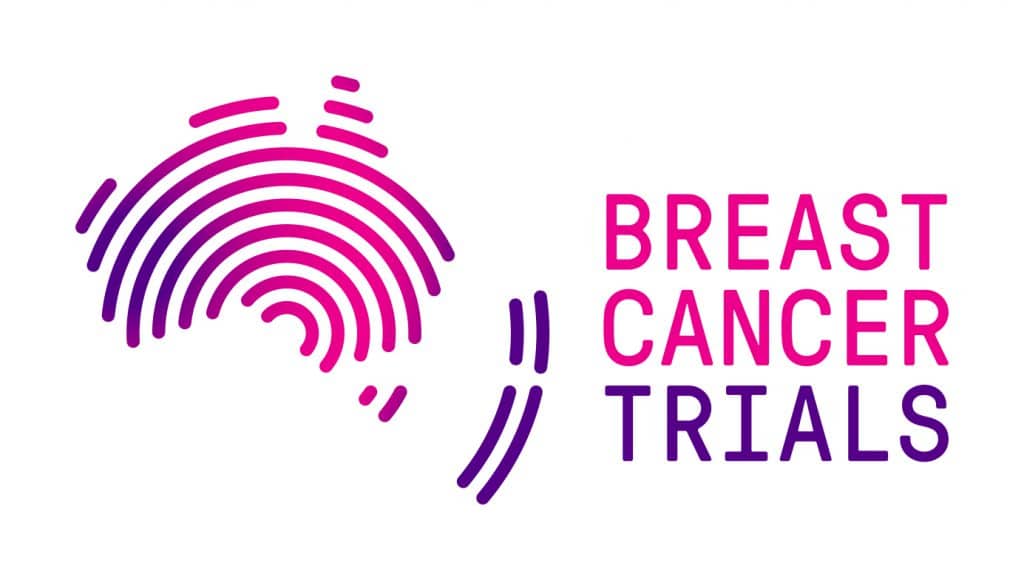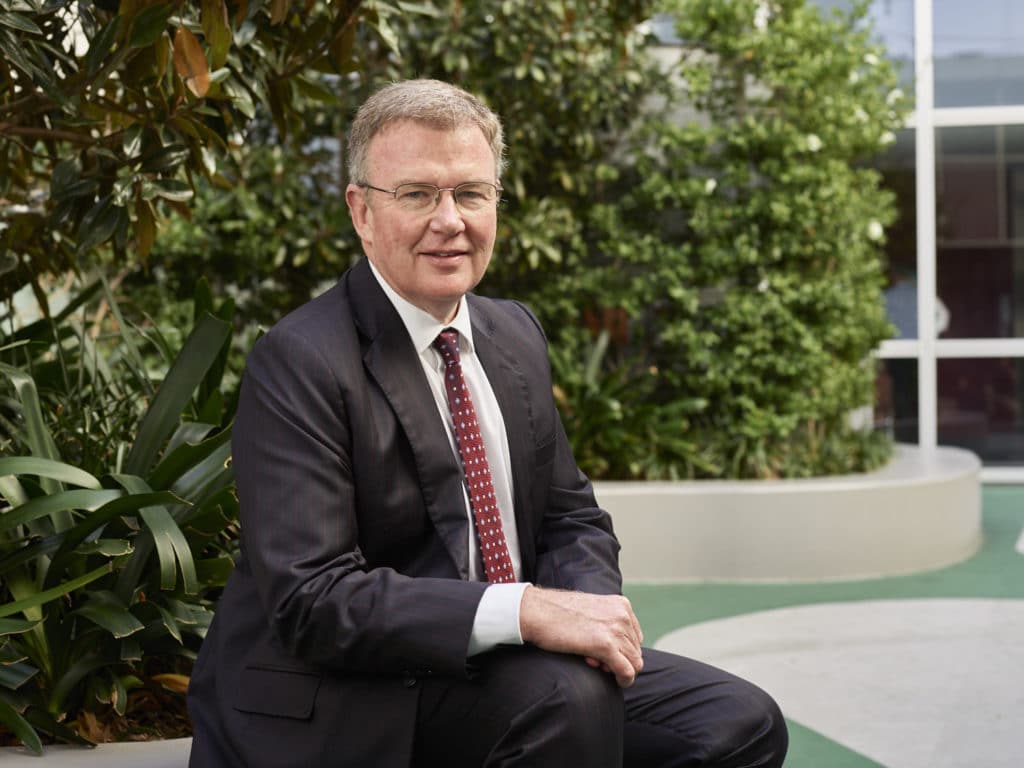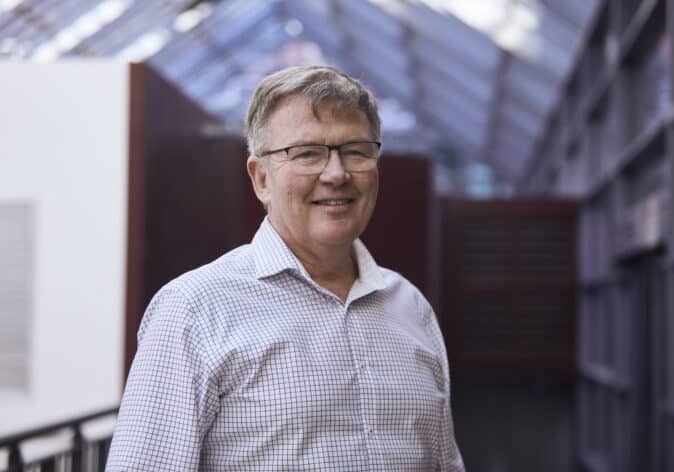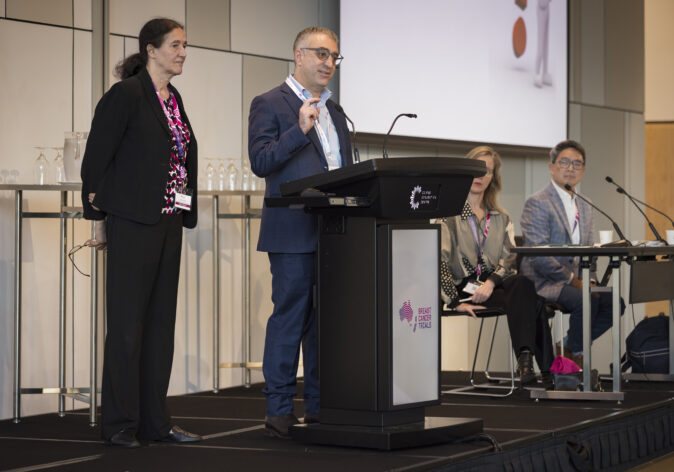Professor Bruce Mann is the Director of Research at Breast Cancer Trials, Professor of Surgery at the University of Melbourne and Director of the Breast Tumour Stream at the Victorian Comprehensive Cancer Centre.
His research interests focus on tailored screening and treatment for early breast cancer, and we spoke to him about some of the key challenges in diagnosing very early breast cancer.
“Very early breast cancer is interesting. What we know is that if breast cancer is diagnosed when it’s stage 1, so that’s when the cancer is less than 2cm in size and has not spread to the lymph nodes, the likelihood that that person will die from breast cancer is really small.”
“And the amount of treatment that’s needed is relatively small. This is an area that many people consider to be sorted because we have good treatments, and with existing treatments the results are extremely good. So, people would say, well, what’s the problem?”
“I see that it has become a challenge because why would you do research into an area that’s already sorted?”
“In addition, there’s quite a lot of controversy or there’s a lot of conversation around the issue of over diagnosis. The concept of over diagnosis, it is important, it is the diagnosis of a condition that, if undiagnosed, would never have become clinically significant in that person’s lifetime. And if you’ve got such a condition, then side effects of any treatment are actually a harm to the individual. That is they would be better off not diagnosed.”
“And so, some people suggest that we’ve got to that point with breast screening, that a lot of the things that are diagnosed should never have been diagnosed, and therefore there’s an ambivalence around screening, and the truth is there’s not that much research going into it.”
“My view and what I’ll be talking about in the conference is that this is an area where there is an enormous potential for us to improve breast cancer outcomes. And there’s two aspects to it. One that I won’t be talking about a lot on but is very much the focus of the session in the conference, is the possibility or the importance of moving away from current screening, which is all women 50 to 74 who are invited to have a standard mammogram every two years.”
“That’s what we’ve been doing since 1993. It’s what we’re still doing. There is, in my view, enormous potential to improve that by moving towards risk adjusted screening, which would mean that individuals would be assessed, and each woman’s individual risk would be determined.”
“And depending on the risk and on other things such as mammographic density, a more personalized screening program would be implemented. And we think that by doing that, we could have something that’s more effective.”
“So, we would find more cancers early, and it’s likely to be cost effective because by finding cancers earlier, treatment would not only be more effective but should be less expensive. So that’s one of the aspects that I would see as the challenges in very early breast cancer. It’s about finding more cancers and diagnosing more cancers at this very early stage.”
Listen to the Podcast
We spoke to Professor Bruce Mann about some of the key challenges in diagnosing very early breast cancer.
“The other aspect to it is the idea of optimizing treatment or de-intensifying treatment. The current treatments are very effective, but all treatments have side effects. Surgery has side effects, radiation has side effects, chemotherapy has side effects, and the hormonal therapies certainly have side effects.”
“Many women who have been diagnosed with breast cancer identify those side effects of treatments as quite severe and would like to be able to safely reduce them. Our current approach is that in my view we haven’t done enough research into that. And so, when we have a patient with one of these very early breast cancers, we say that here is the treatment we recommend and we recommend it not because we know that it’s needed, but we don’t know that it can be safely omitted.”
“And so most people would say, well, look, it’s important that the cancer doesn’t come back. So, if you don’t know that we can safely avoid that treatment, I will take it. And that is how things are. One of the things that we’ve done here is a number of trials in this area.”
“But one of the important ones is our PROSPECT trial, where we used MRI scans after diagnosis in someone with an apparently isolated low risk cancer, to look for other areas of cancer. And those women who had a clear MRI and had no additional cancers, and the cancer itself was low risk, were treated without radiation.”
“The results, we analyzed it a couple of years ago, and what we found is that in 440 women who had the MRI, we found additional areas of cancer in 11%. And they were all treated appropriately. In 201 women who met all the criteria, who were treated without radiation, there was only a single local recurrence at the five-year mark.”
“It was a 1% local recurrence rate, which is less than we hoped for, actually. We were surprised how good it was. But even more surprising, of all 440 women who had the MRI, we found those additional cancers and treated them. Not a single one of those patients has had the original cancer recur around the body.”
“There have been no distant recurrences. And that raises the possibility that perhaps this may be the way that we can find a group of women who could safely avoid, particularly the hormonal blocking tablets.”
“It’s still a hypothesis. We have a follow up study known as PROSPECTIVE, and part of the main aspect of PROSPECTIVE will be to confirm that we can safely omit radiation, but an additional arm will be to investigate whether we could safely reduce the amount of hormone blocking tablets, because if we could do that, it would truly be a big change in the way that breast cancer is considered.”
“It’s a number of years before we do it, but the PROSPECTIVE trial should open later this year and, that’s something that I’ll be talking about in my presentation at the conference on Thursday.”
How important is interdisciplinary collaboraton in treating patients with very early breast cancer?
“The interdisciplinary collaboration is absolutely critical. In PROSPECT, the key disciplines have been the radiologists who generally diagnose the cancers through screening and do the MRIs, the surgeons who do the surgery, the pathologists, and then the radiation oncologists, who assess the situation and confirm that this is a situation where omission of radiation is reasonable.”
“That will be really important going forward for our new study, particularly as radiation oncology has changed and we have new approaches using shorter treatment courses, so that will be important. Other groups who are important include the psychologists. One of the reasons for doing this is that we believe that there will be less psychological impact on patients who are assessed in this way and treated in this way.”
“We’ve been working with Associate Professor Lesley Stafford, who is a clinical psychologist, and her team to do work initially on PROSPECT, but certainly on PROSPECTIVE. And then when we move to the question of reducing the amount of endocrine therapy, the contribution of the medical oncologist will be critical as well.”
“I think the biggest barrier is that participation in breast screening is unfortunately too low. Numbers from BreastScreen Australia suggest that only about 52 or 53% of Australian women are having screening mammograms as suggested. The large majority of these very early cancers are diagnosed through screening.”
What are some of the barriers of challenges that exist in ensuring patients are receiving timely care for their breast cancer?
“So, if someone doesn’t have screening and she’s destined to develop a cancer, it is much more likely that her cancer will be more advanced. If someone has a higher stage of cancer, so a stage two or stage three cancer, the treatments are clearly essential to give her the best chance of survival.”
“My hope for the future of breast cancer care is that we get to a situation where the vast majority of patients who develop breast cancer are diagnosed at stage one or maybe stage two, really before the cancer has spread to the lymph nodes, so that we can use our effective treatments and fully expect that the cancer will not come back.”
“If we can do that, then there will always be a group who present at a later stage, and we will have the capacity and the resources to give those women the very best care that’s available.”
Support Us
Help us to change lives through breast cancer clinical trials research



